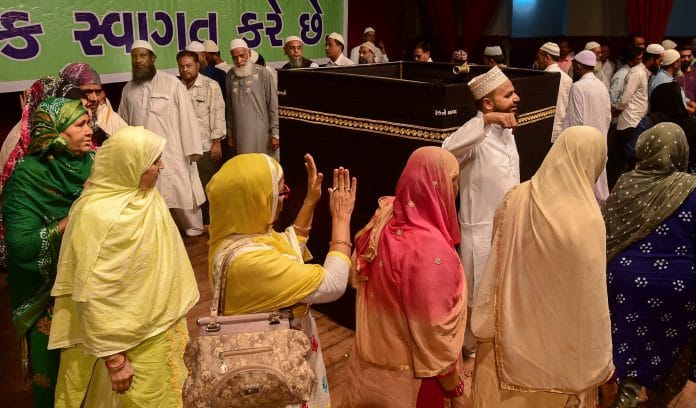Finds minimal rise in literacy levels of Muslims since Sachar, calls for better numbers in forces
New Delhi: While Muslims in India want increased participation in politics, they believe that their current crop of elected representatives do not even ask the relevant questions for the welfare of the community, according to a study released Saturday.
“Democracy should ensure that minority views, opinions and votes are not ignored when governments are formed by majority principles,” says the study conducted by the Institute of Objective Studies (IOS), a United Nations-recognised institute that focuses on problems of Muslims and other minority communities.
“There are not enough Muslim MPs and MLAs and those that are there are not asking the relevant questions,” it adds. There is only 4 per cent representation of Muslims in the Lok Sabha.
The study, Vision 2025 Socio Economic Inequalities — Why does India’s economic growth need an inclusive agenda, assessed the education levels, housing, healthcare, political representation and the socio-economic condition of Muslims in the country. A perception survey was conducted on around 3,500 Muslims in both rural and urban India to deduce their aspirations and challenges.
The authors have used the Sachar Committee report of 2006 as a baseline for the study.
Sinking education levels
One of the biggest challenges that Muslims in India face, according to the study, is in the field of education. As per the report, there has not been a substantial change in the literacy rate among Muslims from the time of the Sachar Committee report.
The literacy rate has risen to 70 per cent from the 59 per cent in 2006. Those surveyed, the report says, want Indian Muslims to change their mindset and give top priority to scientific education. The IOS document also lays greater emphasis on the education of Muslims. “More educational institutions like Aligarh Muslim University should be opened. The state should take proper care of existing schools, madrasas and maktabs and ensure that Sarva Siksha Abhiyan has an equal presence in MCD schools, where a large number of children from the minority community are enrolled,” are some of the suggestions in the document.
The report also found that Indian Muslims want members of the community “to join government services, especially in education and the police”. The document found that since Sachar, the number of Muslims in the police force has fallen. While in 2006, around 7.55 per cent Muslims were in the force, the number has now fallen to 6.5 per cent.
The IOS report also says that the government has done little to help the community. “In the last 10 years, we had the Kundu Committee making its suggestions in the aftermath of the Sachar Committee report. As expected, the BJP-NDA government (and Ministry of Minority Affairs under Najma Heptulla) has put the Kundu Committee recommendations in cold storage. It is in this context that the IOS decided to take a proactive step to envision the future of the Indian Muslim,” reads an excerpt from the report.
‘Don’t link us to Pakistan’
Indian Muslims feel stigmatised when they are linked to Pakistan, the study has found, while calling for a clampdown of such references.
“The right-wing groups’ attempts to link Muslims of India with Pakistan should be nipped in the bud once and for all,” says the study.
Over the past few years, there has been a spate of remarks, from the fringe as well as BJP leaders, associating the country’s Muslims with Pakistan. Controversial Hindutva leader Sadhvi Prachi had in 2015 termed Bollywood actor Shah Rukh Khan as a “Pakistani agent”, who should be sent there after the actor voiced his comments on the extreme intolerance in the country.
“BJP leader Kailash Vijayvargiya had also attacked the actor earlier, saying that his soul resides in Pakistan. Early this year, BJP MP Vinay Katiyar had said that Muslims should not even be living in this country but should go to Pakistan or Bangladesh,” said Amir Ullah Khan, one of the authors of the study.







The caste system in India has a strong impact on society. Thanks for sharing this survey about Indian Muslims in politics.
… such a large minority …
170 million Muslims cannot be wished away, removed from the representative public spaces and consciousness. Kairana sent UP’s first Muslim to the Lok Sabha after almost four years. Some would feel that the sarkari Muslims, often a token presence, are deeply conflicted about their role and responsibilities to their community. Creating a sense of physical and emotional security in such a large majority, more numerous than the population of all but a handful of countries, is in everyone’s best interest. Radicalisation of some young Muslims is a cintingency to be avoided at all costs. 2. A modern, secular education, with emphasis on science and technology, is the community’s passport to better economic prospects. India’s economic progresd will receive a huge boost if Indian Muslims are doing better in all spheres.